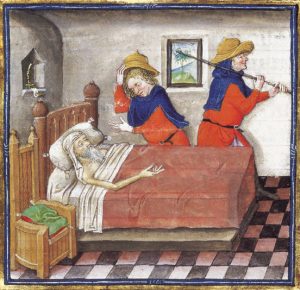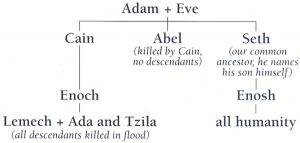Read Elie Wiesel’s essay on Seth in the Bible as it originally appeared in Bible Review, October 1999. It first appeared in Bible History Daily in 2013.—Ed.

An obedient son, Seth (shown twice) listens to his dying father’s last wish, dons his cap and sets out the door to fulfill Adam’s request, in this 15th-century illumination from the Book of Hours of Catherine of Cleves. According to extrabiblical legend, the dying man sent his youngest son back to paradise to obtain anointing oil from the Tree of Knowledge. Pierpont Morgan Library/Art Resource, NY
In the story of the first man and the first woman, we are intrigued by a character about whom we are told very little.
Adam and Eve, we know. After all, they are our ancestors. Each one of us is their direct descendant. Scripture says so, and we are bound to believe it, if only to impose upon ourselves an essential lesson: that of equality. Descended from the same line, no one is superior to another. Nor inferior.
The text provides us with numerous elements about Adam and Eve’s origin, their life as first couple and first parents, their sojourn in paradise and, later, in exile.
That is equally true of their two sons, Cain and Abel. We know their tragic story. The elder and his rejected offerings, the younger and his accepted ones. The dialogue of Cain with God. The first murder and the first death in human history. Abel died unmarried; Cain had children and grandchildren.
After the murder of the younger brother and the flight of his assassin, the text tells us little else about Adam and Eve. They are missing but not dead. For they reappear on the scene. When? A hundred and thirty years, or seven generations, after their first family tragedy and shortly after the death of Cain himself, who is killed by his great-great-grandson Lemech. Suddenly, without minding the non sequitur, the text informs us that Adam returned to his wife, knew her, and she gave birth to a son whom she named Seth: “because God has granted me a new future in place of Abel, killed by Cain” (Genesis 4:25). Then, in the next verse, the text tells us, “To Seth also, a son is born, and he named him Enosh. At that time people began to evoke the name of the Lord.” There it is, almost everything that we know of Seth: Contrary to biblical custom, it is he and not his spouse who gives the name Enosh to their son. For Maimonides, this verse indicates the beginning of idolatry in the world. Enosh and a few chosen ones, such as Noah, Shem and Eber, were the only ones to remain bound to the Lord.a


With Adam’s death, Seth became the patriarch of the first family. With the death of his brothers Cain and Abel and of Cain’s descendants, Seth became progenitor of the rest of the human race, as shown in this greatly abbreviated family tree.
But why are we told so little about Seth? How did he sustain himself? Was he a musician, like Yuval? Did he like the country life or that of the city? How did he live with his aged parents? Did he benefit, or did he suffer, from an excess of love on their part? The reader doesn’t know whether to pity him or to envy him.
A curious thing: In midrashic literature, which is usually so expansive, rather little is said about this character to whom, we shall soon see, we owe so much.b The Midrash is more forthcoming regarding Seth’s family.
A moving midrashic legend recounts that after the death of Abel, the mourning Adam and Eve fall into a profound, melancholy solitude. Far from Paradise, they are no longer in harmony with their environment or with one another. We imagine them silent, lethargic. They no longer desire anything, least of all another child. Undoubtedly, Abel and his cruel fate are too prevalent in their thoughts for them to wish to give him a brother. Years, centuries slip away, and for them, the world is a wasteland. But do they remember the first commandment, to be fruitful and multiply? And if they have forgotten, why doesn’t God remind them of it?
Become a Member of Biblical Archaeology Society Now and Get More Than Half Off the Regular Price of the All-Access Pass!
Explore the world’s most intriguing Biblical scholarship
Dig into more than 9,000 articles in the Biblical Archaeology Society’s vast library plus much more with an All-Access pass.

In the Midrash, it is one of their descendants who reminds them—Lemech. A curious character. He is blind. At a certain time, he takes two women: Ada and Tzila (Genesis 4:19). Why two? One to give him children and the other to give him pleasure. It is to them that he will confess: “Ada and Tzila, listen to my voice! Wives of Lemech, give ear to my word! I have killed a man” (Genesis 4:23). Yes, he had just killed Cain. It was an accident, but it was nevertheless a murder. He is sure that this act will weigh upon not seven generations, as in Cain’s case, but upon seventy-seven. The next verse speaks of the reunion of Adam and his wife. What is the connection?
The Midrash furnishes it for us: Lemech’s two wives separated themselves from him after the birth of their children, saying: What good is it to have children, since God has decreed that the seventh generation after Cain (which is theirs) would be punished? What good is it to give life to children who will die?
Lemech, not too intelligent, asks the advice of Adam, who then reprimands the two wives: Who are you to preoccupy yourselves with the ways of the Lord? He does what He must do, and as for you, do your duty as wives!
Thereupon, says the Midrash, they respond: And who then are you to lecture us? Since the death of your son, it has been 130 years that you have separated yourself from your wife so as no longer to have children—and you tell us to have them? Faced with the logic of Lemech’s two wives, Adam immediately returned to Eve, “and he had a son in his image and according to his form” (Genesis 5:3), whom Eve named Seth. Why Eve and not Adam? Because in the Bible, it is always the woman who names the children. But if so, why did Seth name his son? Was this perhaps to mark the singularity of Enosh, who is so closely linked to Adam and to God? Like Adam, Enosh means “man.” Moreover, the next verse says, “ze sefer toldot adam,” “this is the book of the generations of Adam.” In other words, we are present not at the beginning but at the second beginning of Creation.
Adam’s last son, Seth, resembles his father. We are all his descendants, states the Midrash. It strains to reassure us. In case we were afraid to be Cain’s descendants and inheritors of his original sin, the Midrash tells us, all the descendants of Cain will perish in the Flood, but not those of Seth.
The proof: We are here to tell his story.
Translated from French by Martha Liptzin Hauptman.
Read an interview BAR Editor Hershel Shanks conducted with Elie Wiesel and Biblical scholar Frank Moore Cross, republished from BAR, July/August 2004 >>
Notes:
a. Moses Maimonides (the Rambam) was a great 12th-century philosopher and expert on Jewish law (halakhist).
b. Midrash a genre of rabbinic literature, includes nonliteral elaboration on the biblical text.
The author of more than 30 novels, plays and profiles of Biblical figures, Elie Wiesel received the Nobel Peace Prize in 1986. This online publication is adapted from Wiesel’s article “Supporting Roles: Seth,” which was published in Bible Review in October 1999. At the inception of Wiesel’s Supporting Roles series in Bible Review, BAS editors wrote:
We are pleased—and honored—to present our readers with the first of a series of insightful essays by Elie Wiesel, the world-renowned author and human rights advocate. Wiesel is best known for his numerous books on the Holocaust and for his profiles of Biblical figures and Hasidic masters. In 1986, he was awarded the Nobel Peace Prize. His occasional series for BR will focus on characters in the Bible that do not occupy center stage—those who play supporting roles.
More “Supporting Roles” by Elie Wiesel in Bible History Daily:
The post Seth in the Bible appeared first on Biblical Archaeology Society.


0 Commentaires